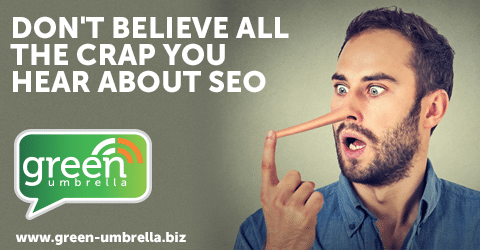Don’t Believe All the Crap You Hear About SEO (Search Engine Optimisation)

Don’t Believe All the Crap You Hear About SEO (Search Engine Optimisation)

I am by no means an SEO expert, and I would never offer this as a service, but rest assured SEO is not dead. Saying that, I am hearing more and more people asking “Is it really important to have an SEO strategy anyway?”, “I get more traction from my social networking sites rather than Google” or “There is not much real-estate left on the first page of Google anyway due to all the adverts, so what’s the point in paying for SEO?”. They are all good questions, but if you are still keen on optimizing your website for Google rankings, then please be aware of these nine myths.
Myth #1 – Reacting to Google algorithm changes immediately helps you move up the ranking more quickly.
I learned this one the hard way! A few years ago now, just before Google introduced Mobilegeddon I was panicking that my site would not be fully compatible with the new changes. I spoke to my web guy who said: “Julia, did you not know that this algorithm has been up and running for about twelve months now, they only give new changes an announcement date when it has been implemented for a while”. I was gobsmacked. Apparently Google test the algorithm changes for a long while before it is announced publically to the world. This means that nothing will change for you overnight if you change something on your site.
Did you know that Google changes its algorithms up to 500 times a year? It is impossible to keep on top of everything (unless you provide SEO as a service). In my opinion, keeping on top of the major changes is important, but if you worried about every single little update then you would never have time to run your business.
Myth #2 – HTTPS is not important unless you are selling stuff
Earlier in the year, I was approached by one of my clients who had been to an SEO seminar. She came back with a full list of things to do, and there was a real panic in her voice when she mentioned the HTTPS site. She was not sure why, but she needed a certificate asap otherwise her site would be blocked from Google.
Firstly, the initial launch of this algorithm did affect those sites that are selling stuff, or those that have a login area (or require someone to add a password). What we have been seeing more and more since early 2017 is the little green lock saying “this site is secure”. Google has said loud and clear that it is now giving preferential treatment to those sites that are encrypted (ie: they have a secure HTTPS site). As mentioned earlier in this blog, Google always runs algorithm changes for a long time before we know about them, so this change is nothing new. In fact, Google first mentioned this change back in August 2014.
Action: Add this to your list of things to do for your website. Your site will still be indexed by Google, even if you haven’t got a HTTPS cert, but remember that Google will give more weight to those that have a secure site.
Myth #3 – H1 tags increase Google rankings
Back in the day, H1 tags were one of the main SEO tactics used to help your site rank well in Google, but this has now changed. H1 or H2 tags to no longer contribute to SEO directly, but they are still important. What really matters on your page is that it contains information that is consistent with your audience’s needs. H1 and H2 tags help segment the content for the user. The better the consumer experience, the longer visitors stay on your site and explore other pages on your website, the higher you will rank in Google’s search engines.
Myth #4 – Backlinking is no longer a good SEO strategy
Backlinking is not dead, but bad backlinking can be very harmful to your site. Back in the olden days, SEO experts would add your website link to many websites. In Google’s eyes, the more websites that your link is on, the more Google thought it was an authoritative site. Google was thinking “Blimey, this must be a good website because look how many other websites are mentioning it and giving it links – so let’s give it more weight in the Google ranking”. Google soon realised that SEO experts were creating dummy, or ghost, websites and listed on these sites were lots and lots of website links. Bottom line is that you should work hard to get your link on other websites that are credible and relevant.
Action: Find out where your backlinks are. If you have your website link on another website that is not from a credible source then you need to take action to get this removed.
Myth #5 – Hosting my website in the US when my business is in the UK is bad for SEO.
Sorry for pointing out the obvious, but yes, it is better if you host your website in the country that you operate from, but it does not really effect your SEO. Google is clever enough to know that you are a UK or US business, so hosting of the site does not really have an impact on your SEO. At the end of the day, Google gives priority to the quality of content, over the locality of the site. That means that .co.uk sites are shown to UK viewers and .NZ are shown to New Zealand viewers as a priority.
Myth #6 – Having an XL sitemap will improve your rankings
I thought this one was true until my web guy explained to me that yes, having a sitemap certainly helps Google crawlers to your site. It gives them a path to follow and makes the job much quicker, but there has never been any studies or reports from Google to say that it has an impact on your SEO.
Myth #7 – SEO is all about keywords
Keywords still do play an important factor, but they need to be relevant. No longer can you just add a lot of keywords into your page or blog post and expect it to rank for those words if you have not used those words within:-
a) The title of your page or blog
b) The subtitles of your article
c) Within the content of your page or blog
d) Within the meta description and SEO title
In other words, if the keywords are relevant to the content that you are writing about then yes, this will help with your SEO. But blindly adding keywords such as location, products, company names, industry keywords against an article that does not mention any of these words then you will find that it has little or a negative impact in the Google algorithm. Google is clever like that!
Myth #8 – My social media does not affect my ranking
Yes it does! It makes total sense that if you have people sharing your content on Twitter, Facebook or LinkedIn then this is telling Google that your content is valuable and relevant. It’s great content if people are willing to share, comment or like, therefore you are rewarded for this by a positive impact in the Google rankings.
Myth #9 – Blogging does not affect SEO
Wrong! So wrong! Blogging is one of the best ways to get great SEO and believe me, it works. Green Umbrella is living proof! Producing regular content for your website (that is customer focused), works brilliantly. We started 2016 with 5000 sessions a month on our Google Analytics. We implemented a regular 3 days a week content strategy and within 12 months we are now topping 30k sessions a month. We have not paid for advertising, and this traffic has purely been due to content. Over 20k sessions a month are due to organic search.
Summary
In my opinion, don’t spend your time worrying about SEO. Spend your valuable time producing good, quality content for your audience and the rest will follow. If you try to manipulate the algorithms then you will constantly need to change your strategy.
[social-bio]
Share this!


